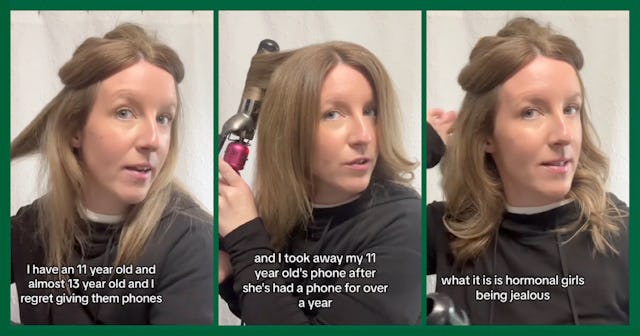Mom Who Took Away Her Daughter’s Phone Makes A Plea To Other Parents
“What’s going to happen? I don’t know.”

One of the great challenges of parenting older kids in the 21st century is, unfortunately, without precedent: smartphones. When is the right time to give your kid a phone? What kind of restrictions should be put on it?
One mom on TikTok — @the_geriatricmillennial, aka Kailey — has tween daughters and regrets giving them phones at 10 years old. So much, in fact, that she’s calling in a mulligan.
“I deactivated my 11-year-old’s phone. I took it away and I don’t know when I’m going to give it back.”
Her decision has prompted a spirited discussion in the comments of her viral video.
Kailey notes that both her daughters got phones at 10 “for [her] peace of mind.”
She appreciated that they allowed her children to have more independence — to roam the neighborhood and go to friends’ houses — while still being able to get in touch and track them virtually. Especially, she says, since often parents don’t have landlines or even necessarily communicate with one another. The initial decision to give her daughters phones was a struggle, she says, but ultimately she felt safer knowing they had them.
But things soon began to get out of hand.
Now, she says, “I am seeing firsthand how detrimental they can be.”
“It’s not so much the social media,” Kailey continues. “You can block the social media. That stuff’s all easy. What it is is ... hormonal girls being jealous.”
She offers the example of her daughter being out with a friend, who posts a picture of them on Snapchat, which prompts another friend to get upset her daughter is out with that friend instead of her, which prompts upset and accusatory texts.
“And then my daughter feels bad and she has to make up a lie because she doesn’t want to hurt that friend’s feelings.”
She’s very aware that jealousy is not a consequence of phones. Interpersonal dramas like this long pre-date the advent of iPhones, but she believes constant access to one exacerbates the issue in a way that’s not healthy for tweens and teens, and other parents and teachers have commiserated with her.
“We can’t keep them from having phones forever ... they’re a part of the teenage experience now, but at what expense?” she asks. “We as parents need to band together and agree that we’re not going to allow it until 14, 15, 16.”
The response from Kailey’s followers was mixed. Many sympathized with her plight, having experienced similar issues with their own children.
“My daughter is 11,” replies @barbaralynn0110. “I reluctantly got her the phone last summer. I totally regret it. The texting drama is nuts. I have all social media blocked.”
“My daughter [got] her phone around 11/12 and now is 19,” says @rn_angie. “She even agrees she was too young to have a phone.”
But others were skeptical the phone was the problem.
“When you take it away they will hide more from you,” observes @meltonpartyof4. “They will make accounts on their friends [sic] phones, and now they won’t talk to you about problems.”
Others suggested the phone is the secondary problem: that this is an issue of Kailey’s daughter setting boundaries with friends and learning to stand up for herself. Many others shared their experiences of being “the kid without a phone” and feeling socially isolated as a result.
“You actually think taking the phone away is going to stop conflict,” writes @fashionmechic in the comments section’s most liked response. “It’s going to be worse now. I understand thinking they’re too young it’s just your reasoning makes zero sense. We aren’t going back.”
Kailey created a response to this comment, noting that she firmly believes her decision will be for the best.
“I know that we’re not ever going to go back,” she says. “But there has to be some sort of healthy medium and I don’t think having an iPhone is it for my daughter.”
Every kid and family is different. And while it’s true that they’re going to have to learn to cope with these issues at some point, the question of when that should be isn’t fading anytime soon. Until then, it’s interesting to see one parent actually close Pandora’s box... at least for now.